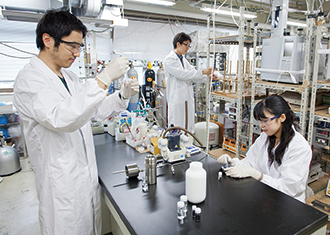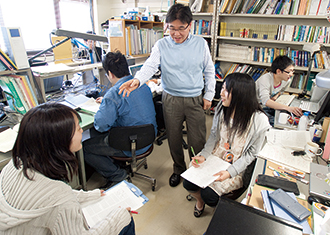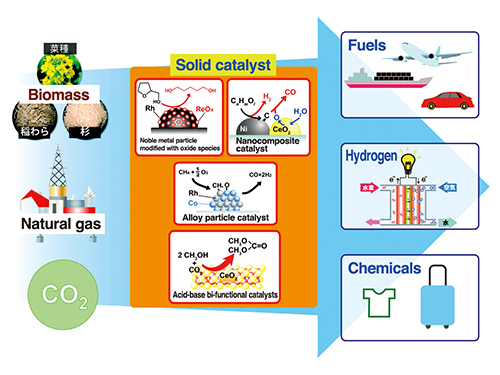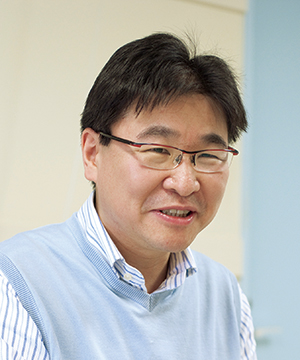Energy Resource Chemistry
Development of high-performance catalysts for the sustainable society in the field of energy and environment


In our everyday lives we are surrounded by petroleum products, from the gasoline our cars need to the polyesters used to produce the materials for our clothes. Catalysts are used to reduce the activation energy required for chemical reactions and speed up these reactions, while at the same time opening up a variety of new routes. Thus, catalysts play a vital role in the production of chemical products from oil. Functional catalysts can also help to reduce the environmental impact of production processes. Our mission is to develop new and more powerful catalysts for promoting material conversion processes for the purpose of efficient energy production and environmental harm minimization.
At the moment our research is focused on creating solid catalysts for converting biomass resources. For instance, environmentally friendly hydrocarbon resources such as rice straw and wood scrap are readily available and easily recycled, and could play a major role in the production of renewable chemicals and alternative fuels as oil reserves become exhausted. Likewise, natural gas harbors considerable potential as a liquid fuel if efficient conversion processes can be developed. However it is currently much easier to convert oil, so the aim therefore is to improve conversion efficiency. To this end, we are continually designing, testing and analyzing new catalysts in a bid to find the optimum solution for each process.
In the future, we will see further advances in technology for conversion of non-petroleum base materials used to make liquid fuels and chemicals, which could pave the way for the so-called hydrogen-based society. If we can develop processes for making hydrogen from a variety of renewable resources, this would make a very significant contribution to solving the problem of global warming. Thus, one of our key challenges is the development of viable hydrogen production technology.
Research into catalysts requires a very broad scope of scientific knowledge but also provides a wide range of experiences. I believe that catalyst research embodies the very essence of what it is to be a scientist.

Catalysts for the conversion of renewable and fossil resources
Main Research Themes
- Making solid catalysts for converting resources (design)
- Elucidating the reaction mechanisms over solid catalysts
- Developing catalysts for making hydrogen and synthesis gases from natural gas and biomass
- Developing catalytic reaction processes for producing biomass-derived chemicals
- Developing catalysts for converting carbon dioxide into useful chemical products

Professor of Applied Chemistry at the Graduate School of Engineering
Doctor of Science
Keiichi Tomishige
Graduated from Tokyo Metropolitan Institute Fuji Senior High School in 1984. Started a doctorate of chemistry at the Graduate School of Science, University of Tokyo in 1992 and left mid-way through but eventually completed the course in 1997 (Doctorate of Science, Graduate School of Science, University of Tokyo). Served as Lecturer in Applied Chemistry at the Graduate School of Engineering, University of Tokyo, followed by Associate Professor at the Graduate School of Pure and Applied Sciences, University of Tsukuba, before assuming current role in 2010. Motto of the Tomishige Laboratory: Persist until you accomplish what you set out to achieve.

